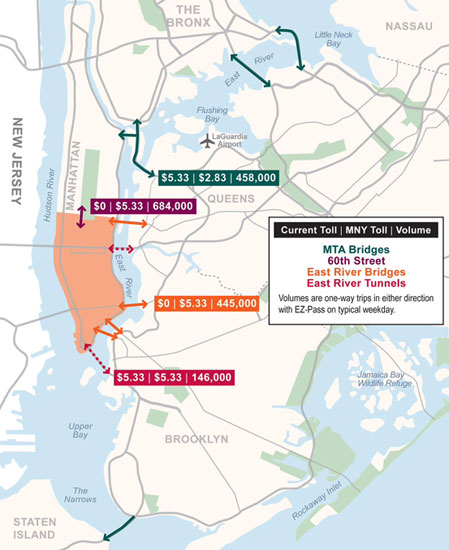
When Governor Nelson Rockefeller merged New York's commuter rail lines, the NYC Transit Authority, and Robert Moses’s Triborough Bridge and Tunnel Authority to form the Metropolitan Transportation Authority in 1968, he had several motives. The new agency consolidated political power, made more efficient use of regional infrastructure, and devoted surplus bridge and tunnel toll revenues to rescue a faltering transit system.
That last idea, making drivers pay for transit, had a powerful logic, since drivers themselves benefit from viable transit that prevents stifling traffic jams. But the original set-up had a built-in flaw: New York's tolled crossings compete with free bridges.
Today, almost half a century later, this formula is broken. "Toll shopping" is exacerbating gridlock in communities on both sides of the free East River bridges and throughout the Manhattan central business district while eroding MTA revenues. Meanwhile, the MTA needs a new revenue stream to fund its next capital plan, but current users of its crossings are balking at soaring tolls while adjacent bridges remain free.
Excluding the Port Authority-controlled Lincoln and Holland Tunnels, an estimated 1,733,000 car and truck trips are made into or out of the CBD or on a major MTA bridge each weekday. Each trip that crosses the CBD boundary imposes, on average, two hours of aggregate delay on all other drivers (more during rush hours, less during off-peak hours). Yet only 604,000 -- 35 percent -- of those 1.7 million-plus trips are tolled: 458,000 on the MTA bridges plus 146,000 through the MTA’s Queens Midtown Tunnel and Brooklyn Battery Tunnel (see graphic).
The remaining 1,129,000 trips -- of which 445,000 enter or exit the CBD via an East River bridge while 684,000 cross 60th Street -- pay nothing. (These and other figures in this post are derived in my Balanced Transportation Analyzer Spreadsheet [PDF].)
What do tolls on the MTA bridges and tunnels have to do with free passes for trips across 60th Street and the East River bridges? Plenty. The toll on the MTA's four major bridges -- the Triboro, Whitestone, Throgs Neck and Verrazano -- keeps rising because the agency has no other choice than to support its transit operations by maximizing its bridge tolls. Put another way, if the agency could apply an equitable toll to every East River crossing and 60th Street, then tolls could be lowered from the current $5.33 rate with E-ZPass ($7.50 without).
Want to see just how out of whack NYC’s toll scheme has become? If every "portal" to and from the CBD (60th Street, the East River bridges, and the two MTA tunnels) and the four major MTA bridges were tolled at the same rate, a uniform charge of just $2.00 would raise as much revenue as now comes from the $5.33 E-ZPass/$7.50 cash toll on the MTA bridges and tunnels. That means that out of every $5.33 toll the MTA collects on its bridges and tunnels, $3.33 effectively goes to subsidize free rides into and out of the Manhattan CBD.
If this unfairness were the only defect in New York transportation finance, the cure would be simple: slap a two-dollar toll on every New York crossing into and out of the CBD while bringing tolls on the MTA tunnels and major bridges to that level as well. But the funding shortfall for transportation infrastructure is at least as pressing, a point underscored by the MTA Capital Program Review Board’s rejection last week of the authority’s $32 billion, five-year capital plan due to a $15 billion budget hole.
The remedy is almost as simple as a $2 flat toll: Apply the current $5.33 each-way MTA toll to the East River bridges and 60th Street crossings while lowering the toll on the four major MTA bridges to $2.83 each way -- a $2.50 break from the current $5.33 rate. This would bring in between $1.4 and $1.5 billion in recurring annual net revenues -- sufficient to bond at least $20 billion in capital spending. That, in a nutshell, is the Move NY Fair Plan, conceived by traffic guru Sam Schwartz. (Other key elements, a taxi and Uber surcharge to generate additional revenues and make sure residents of Manhattan pay their fare share in return for cutting congestion and modernizing transit, can be discussed at another time.)
More and more, Schwartz’s idea of extending the $5.33 MTA each-way tunnel toll to every CBD entrance and exit, while lowering tolls on the bridges that don’t funnel traffic into the CBD (and that lack viable transit options), is looking like a winning formula for replacing the Rockefeller model. No other approach promises to redress the long-standing tolling inequity between free CBD trips and steeply tolled MTA bridges and also generate a robust new revenue stream to pay for better transportation -- all while curbing vehicular gridlock in and en route to the CBD.
Consider how the politics of this plan differ from prior attempts to reform the region's tolling system. Move NY’s commitment to allocating one-fourth of the new revenues to roads and bridges while devoting the remaining three-fourths for transit is winning adherents among drivers. Endorsements from both AAA-NY and the NYS Motor Truck Association are a striking departure from past opposition and a hopeful indicator that this new plan can go the legislative distance.





